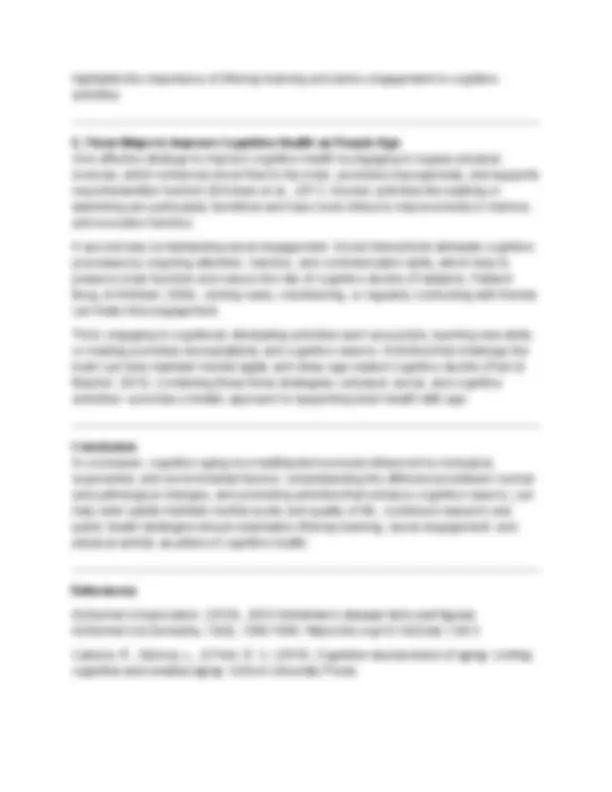




Study with the several resources on Docsity

Earn points by helping other students or get them with a premium plan


Prepare for your exams
Study with the several resources on Docsity

Earn points to download
Earn points by helping other students or get them with a premium plan
Community
Ask the community for help and clear up your study doubts
Discover the best universities in your country according to Docsity users
Free resources
Download our free guides on studying techniques, anxiety management strategies, and thesis advice from Docsity tutors
The Impact of Mobility on Older Adults Promotion
Typology: Summaries
1 / 4

This page cannot be seen from the preview
Don't miss anything!



Cognitive Aging: Brain Changes, Impacts, and Strategies for Improvement
Introduction As the global population ages, understanding the cognitive changes associated with aging becomes increasingly important. While aging naturally involves changes in brain structure and function, these do not always result in debilitating cognitive decline. This paper explores age-related brain changes, the impact on cognition, differentiates between normal aging and disease-related cognitive decline, examines the correlation between life experience and cognitive outcomes, and presents strategies to maintain and improve cognitive health in older adults.
1. Age-Related Changes in Brain Structure and Function As people age, the brain undergoes several structural and functional changes. One prominent structural change is the reduction in brain volume, particularly in the prefrontal cortex and hippocampus, which are critical for executive function and memory, respectively (Harada, Natelson Love, & Triebel, 2013). There is also a decrease in the density of synaptic connections and dendritic branching, which can reduce neural plasticity. Additionally, the white matter, responsible for efficient communication between brain regions, shows signs of degeneration and reduced integrity (Fjell & Walhovd, 2010).
Functionally, aging brains often demonstrate altered patterns of neural activity. For example, older adults may show decreased activation in certain brain areas during cognitive tasks but increased activation in others, potentially as a compensatory mechanism (Cabeza et al., 2018). Neurochemical changes, including reductions in neurotransmitters such as dopamine and acetylcholine, also contribute to altered cognitive processing. Overall, these changes reflect a decline in some brain functions, though not all areas or functions are equally affected.
problem-solving and multitasking more difficult (Salthouse, 2019). Episodic memory, or the ability to recall specific events, also tends to decline due to hippocampal shrinkage and changes in neural connectivity. However, other types of memory, such as semantic memory (general knowledge), remain relatively stable or even improve with age (Nyberg et al., 2012).
Despite these challenges, many cognitive abilities are preserved or compensated for by lifelong learning and experience. For example, older adults often show better emotional regulation and vocabulary, reflecting crystallized intelligence. The brain’s ability to adapt through neuroplasticity allows some cognitive functions to be maintained through
2. How Do These Changes Impact Cognition and Thinking? The structural and functional changes in the aging brain affect cognition in multiple
ways. Older adults often experience declines in processing speed, working memory, and executive function, which can make complex problem-solving and multitasking more difficult (Salthouse, 2019). Episodic memory, or the ability to recall specific events, also tends to decline due to hippocampal shrinkage and changes in neural connectivity. However, other types of memory, such as semantic memory (general knowledge), remain relatively stable or even improve with age (Nyberg et al., 2012).
Despite these challenges, many cognitive abilities are preserved or compensated for by lifelong learning and experience. For example, older adults often show better emotional regulation and vocabulary, reflecting crystallized intelligence. The brain’s ability to adapt through neuroplasticity allows some cognitive functions to be maintained through strategies like increased reliance on accumulated knowledge or alternative neural networks.
3. Normal Changes in Cognition Versus Disease-Related Changes Normal cognitive aging involves gradual and mild declines in specific domains such as processing speed and episodic memory but generally does not interfere significantly with daily functioning (Harada et al., 2013). These changes are expected and vary widely among individuals. Older adults can still learn new skills and engage meaningfully with their environment despite some cognitive slowing.
In contrast, disease-related cognitive changes, such as those seen in dementia or Alzheimer's disease, are more severe, progressive, and affect multiple cognitive domains, including language, judgment, and spatial abilities (Alzheimer’s Association, 2023). These pathological changes result from abnormal brain proteins, widespread neural damage, and loss of brain cells, leading to impairments that interfere with independence. Early diagnosis is important to distinguish normal aging from conditions that require medical intervention.
4. Correlation Between Life Experience and Cognitive Outcomes in Older Adults Research consistently shows a positive correlation between rich life experiences and better cognitive outcomes in older adults. Factors such as higher education, engaging in intellectually stimulating occupations, and participation in social and leisure activities contribute to cognitive reserve—the brain’s resilience to damage (Stern, 2012). Life experiences promote neural plasticity and help maintain cognitive function by strengthening and creating new neural connections.
Moreover, individuals who actively engage in mentally stimulating activities tend to have a lower risk of cognitive decline and dementia (Park & Reuter-Lorenz, 2009). The variety and complexity of life experiences act as a protective buffer, allowing older adults to maintain functional cognition despite age-related neural changes. This
Erickson, K. I., Voss, M. W., Prakash, R. S., et al. (2011). Exercise training increases size of hippocampus and improves memory. Proceedings of the National Academy of Sciences , 108(7), 3017–3022. https://doi.org/10.1073/pnas.
Fjell, A. M., & Walhovd, K. B. (2010). Structural brain changes in aging: Courses, causes and cognitive consequences. Reviews in the Neurosciences , 21(3), 187-221. https://doi.org/10.1515/RNS.2010.
Citation: National Institute on Aging. (2024, June 11). Cognitive health and older adults. National Institute of Health. https://www.nia.nih.gov/health/brain-health/cognitive- health-and-older-adults
Citation: Columbia Mailman School of Public Health. (2021, June 10). Changes that occur to the aging brain: What happens when we get older. https://www.publichealth.columbia.edu/public-health-now/news/changes-occur- aging-brain-what-happens-when-we-get-older